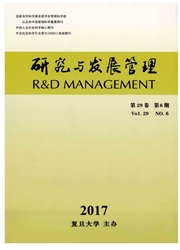

 中文摘要:
中文摘要:
企业的持续竞争优势很大程度依赖于网络搜寻.本文将网络搜寻划分为知识搜寻、关系搜寻和惯例搜寻3个类型,主要研究企业不同战略导向和网络位置给不同类型的搜寻造成的差异化影响.在相关文献梳理的基础上,提出了变量之间关系的理论假设,以具有较强研发合作强度和深度的典型行业为对象进行问卷调研,运用多元回归等方法进行实证检验.主要研究结论包括:企业家导向和网络结构洞都有利于企业网络搜寻的提升,过度的市场导向不利于知识搜寻的提升,在网络中位于中心位置的企业往往不愿改变其惯例.研究结论有助于指导企业合作创新行为,使企业占据有利的网络位置,获取更多的网络资源,从更深层次上把握创新网络运行的内在规律,取得持续竞争优势.
 英文摘要:
英文摘要:
Enterprise sustainable competitive advantage depends heavily on network search. Dividing network search into knowledge search, relationship search and routine search, it studied the differentiated impact of enterprises' differ- ent strategic orientation and network location on different types of search. On the basis of the related literature, it pro- posed the theoretical hypothesis of the relationship between the variables, surveyed enterprises with strong R&D cooper- ation intensity and depth as research sample, and used multiple regression and other statistical methods to analyze data. The results show that: entrepreneurial orientation and network structural holes enhance the enterprise networks search ; excessive market orientation doesn't enhance the knowledge search; enterprises located in network's central position of- ten reluctant to change their routine. The conclusion helps to guide enterprises cooperative innovation behavior, there- fore enterprise can occupy a favorable position, get more network resources, grasp the inherent laws of the technology innovation network, achieve sustainable competitive advantage.
 同期刊论文项目
同期刊论文项目
 同项目期刊论文
同项目期刊论文
 期刊信息
期刊信息
